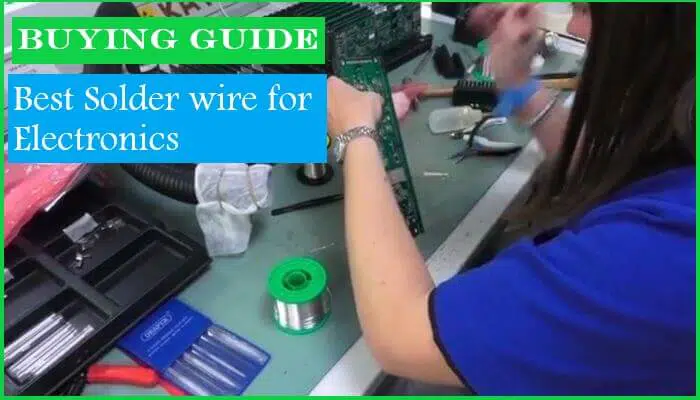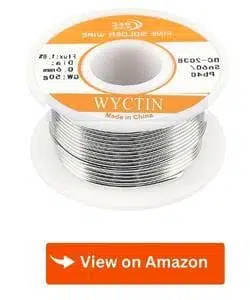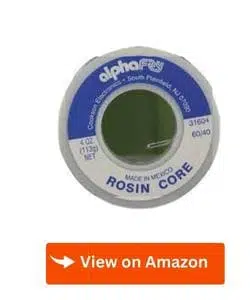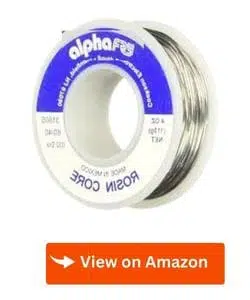This electronic component is used to connect electronic components to the PCB. You should pay more attention to how the solder wire is selected in a soldering job because the solder joint quality depends on the solder selection.
We’ve researched and tested more than 30 solders for electronics to find the best options available in the marketplace. When choosing a solder for electronics, we have to keep in mind certain key factors like melting point, composition, and type of flux used in solder. It’s also important to follow safety precautions while dealing with solder wire and paste.
If you are new to soldering read my article: How to Solder Electronics Components
What is the best solder for electronics – comparison table
In this Guide, After my honest and real testing, I reviewed and shortlisted the 5 best soldiers for electronics along with my top 3 picks, So that you can choose your winning product.
How We Test
As already stated, all solder wires look the same as wire, but if we go deep, we will find that their types and compositions are different and decide the best solder for the electronics selection factor. The most common type of lead solder is made of tin and lead.
Composition:- Composition of a Solder made of either lead-based or lead-free Solder contacts. Due to the low melting point and essay, 60% tin and 40% lead are the most popular, but lead-free is recommended for commercial use due to health hazard requirements.
The diameter of the solder wire:- Solder wire comes in various diameters to solder different electronics applications prepared usage. Larger solder joints require a higher diameter, and accurate solder smaller diameter is recommended for small joints. Typical solder diameters include 0.062 inches and 0.032-inch diameter solder for general purposes.
Spool Size:- if you have a few projects or more minor soldering jobs, you will be recommended to purchase smaller spools, and for big jobs to save money, prefer a bigger one. Standard spools come in terms of 50 grams or 100 grams of weight.
Flux:-Flux is the central part of the wire and is mainly used for Oxidation removal for solid joint formation. Rosin is the most popular type of flux used in normal practice. An acid core is used in joint plumbing jobs.
what is the best solder for electronics in 2024?
The best quality solder for electronics out there on the market is the Kester and Wyctin solder. They are the best because they are of perfect diameter, are easy to use, and are affordable in the price range.
1. WYCTIN 60-40 Tin Lead Rosin Core Solder Wire
If you’re looking for a solder for electronics repair that can get a Lower melting point, more smoothly soldering, and a Perfect combination of tin and lead, this may be the Solder wire you’re looking for.
Wyctin solder 60/40 Tin Lead Rosin Core Solder Wire is the best choice that helps users get solid long-life joint formation. This solder works fantastic on all types of repairs.
Some key highlights include this product: Easy to melt at a low 361 Fahrenheit, comes in 1.8% flux content, and a Rosin Core Flux is reliable for solder joint formation for circuit boards. Wecytin is the best solder for thin electronics strands (0.6 millimeters) and is perfect for repairing small electronics.
If you’re looking for a reliable solder for electronics with easy-to-use and affordable prices, this Wyctin solder is the best selection. Repairing circuits, rewiring cable systems, and repairing stereos, TVs, toys, and other small electrical appliances are the main components when fixing and repairing household electrical issues.
Wyctin solder packed in 1 x 0.6mm 50gram 60 40 rosin core solder Spool. Although this spool is perfect for small parts of DIY electronics, it is not suitable for many applications. Good flow helps evenly, and clean, with less smoke, and the solder joints are reliable and smooth.
Key Features:
- Good Melting Point.
- The solder wire is designed to be user-friendly.
- The solder wire is made up of a mixture of 60% tin and 40% lead.
What I Like/Dislike About Wyctin:
Like:
- Widely available.
- Provides excellent electrical conductivity.
- This solder wire can be used for various soldering tasks.
Dislike:
- Too thin for large projects or large components soldering.
2. KESTER SOLDER 24-6040-0027 Wire Solder
KESTER Wire Solder 24-6040-0027 is a 60/40 solder rosin wire for soldering electronics. Best Activity Flux is Designed to get perfect wetting results with ideal quality and solid joints. Kester is such a famous brand in the DIY electronics section that even the US military uses it.
Kester is a well-known and popular brand used in high-precision soldering jobs. It is higher side but the best solder for cell phone repair. The solder is excellent for wetting nickel surfaces and works well on wires or other elements. You receive about a pound of solder in this spool, enough to set you up for a year of minor to mid-level DIY electronics.
Alpha Fry AT-31604 60-40 Rosin Core Solder 370 degrees Fahrenheit is a perfect solder for electronics. KESTER SOLDER 24-6040-0027 Wire Solder 0.031 inches with very high conductivity.
The solder wire in the spool is 0.6mm 50 grams 60-40. The excellent flow helps melt evenly and cleanly, resulting in fewer solder joints that are reliable and smooth. Most customers believe Kester’s higher price tag is worth the inconvenience.
Key Features:
- Kester solder wires leave a minimal flux residue.
- Kester solder wires are suitable for a wide range of applications.
- High-Quality Construction.
What I Like/Dislike About KESTER Wire Solder:
Like:
- Provides excellent electrical conductivity.
- This solder has a relatively low melting temperature.
- Kester 24-6040-0027 Wire Solder is compatible with a wide range of metals.
Dislike:
- A little bit expensive.
3. Alpha Fry AT-31604
Alpha Fry Fine electrical soldering is made in Mexico, a product of the American Terminal Brand. One of the best solders for electronics is a lead electrical solder with a 0.062 Diameter of wire and 4 ounces in weight.
Alpha Fry AT-31604 60-40 Rosin Core Solder 370 degrees Fahrenheit is a perfect solder for electronics. In jobs such as fine electrical soldering, where melting temperatures need to be lower, the 60% tin and 40% lead combination is ideal.
Alpha Fry is chock full of features that can be used in almost all electrical work requiring lower melt temperatures to form solid and shiny solder joints. Most customers are satisfied with how this solder melts and produces strong joints. Overall, Alpha Fry AT-31604 60-40 Rosin Core Solder is a good solder for electronics repair.
Key Features:
- Good Melting Point.
- It contains a rosin core.
- The solder is made up of 60% tin and 40% lead alloy.
What I Like/Dislike About Alpha Fry:
Like:
- Good electrical conductivity.
- An American-quality product manufactured in Mexico.
- Provides excellent electrical conductivity.
Dislike:
- Not broad enough to handle large jobs.
4. Alpha Metals
Regarding trusted names in Solder Wire, Alpha Metals is a name most people know. Users have found this solder wire reliable yearly and reach for it often. The Alpha Metals 31605 Lead Solder is a 60% Tin, 40% Lead rosin flux cored 4 oz 0.032-inch spool packaged in a box. The product is 3oz 0.032-inch in diameter.
Three hundred seventy degrees Fahrenheit makes it possible to produce perfect soldiers for electronics. Alpha Fry AT-31604 rosin core solder 60-40 is the best automotive wiring.
Alpha Metals am 31605 Lead Solder 370-degree melting point makes it a perfect solid joint with incredible shine. This solder is stable rosin flux filled with plenty of stickiness. It is easy to work with, thanks to its 370-degree melting point. Most customers believe it is priced well, considering its high quality.
The solder wire in the spool is 0.6mm 50 grams 60-40. The excellent flow helps melt evenly and cleanly, resulting in fewer solder joints that are reliable and smooth.
Key Features:
- Good Melting Point.
- Solder wire often has a flux core.
- Lead solder has a relatively low melting point.
What I Like/Dislike About Alpha:
Like:
- It’s a 60/40 blend.
- Spool weight: 4 ounces.
- Having a high conductivity.
Dislike:
- No such observations.
5. Cardas
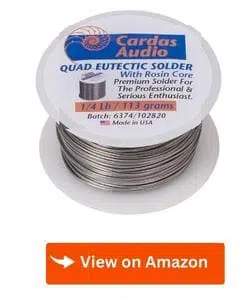
George Cardas created this high-quality ultra-pure, Quad Eutectic solder to perfectly join the connector to the conductor. Quad Eutectic solder contains a proprietary silver, copper, tin, and lead blend. Outside diameter: 0.032″ (0.8mm) solder electronics
It is packed in a 1 x 0.6mm 50gram 60-40 Solder Wire Spool. Good flow helps Melt evenly and cleanly, with less smoke, and solder joints are reliable and smooth.
Cardas Soldering Wire Quad Eutectic solder 1/4 lbs (110 gram) roll contains a proprietary blend of silver, copper, tin & lead solder electronics. It is packed in a 1 x 0.6mm 50gram 60-40 Solder Wire Spool. Good flow helps Melt evenly and cleanly, with less smoke, and solder joints are reliable and smooth.
Key Features:
- Quad Eutectic Composition.
- Silver Content for excellent soldering performance.
- Formulated to produce minimal residue during the soldering process.
What I Like/Dislike About Cardas:
Like:
- Low melting point.
- Minimal oxidation.
- It is known for its robustness and long-lasting solder joints.
Dislike:
- Quad Eutectic Silver Solder tends to be more expensive compared to other types of solder.
How To Solder Wires And Components Easily
Buying Guide: How To Choose the best solder wire for Electronics Repairing
In the marketplace, there are many types and brands available in the market. Choosing good solder for electronics can be pretty discreet based on your requirements, While most solder looks a lot like wire.
Solder is not used only in soldering; the electronics component is also used in solder is also used for plumbing.
Features that matter
Choosing the top solder for electronics may seem complicated for a beginner, especially if you’re unfamiliar with the product’s features and functions. To help you find the best options, we have listed 5 best solder for electronics repair items by item.
The best electronics were soldering wire lead-free production manufacturing process commonly involves casting, extrusion, drawing, and wire spooling. After casting, the resulting solder billets are usually processed by extrusion into solid or fluxed cored soldering wires. Lead-free soldering wires to be evaluated shall have flux in the core.
We considered the below factors while selecting the best solder wire for electronics.
What size solder to use
For normal soldering work, the recommended diameter of such an electronics solder is 0.711-mm to 1.63-mm. The diameter you choose depends on the size and martial you will use. Use the larger diameter for big jobs and medium-size for routine appointments.
Types of solder
There are two cores which are the Rosin and the acid core. Flux core solder wire means that there is flux inside the core of the solder wire. Commonly best rosin core solder in leaded option 60 40 rosin core solder and lead-free rosin core solder is used in wide applications.
Length of the Wire spool
From a soldering quality point of view, no such dependency, but electronics solder has a more oversized spool that saves the cost.
Composition
The question you might have at this point is: which alloy breakdown works best when building and repairing electronics? This solder has the highest melting point, between 360 and 370 degrees Fahrenheit. Furthermore, it has an easy melting point of 60 percent tin and 40% lead.
For example, solder with a 63% tin and 37% lead breakdown melts at 361 degrees Fahrenheit, resulting in finished projects that go together much more quickly. Additionally, it eliminates the risk of melting peripheral metals with a soldering gun.
What type of solder do you use for electronics?
Solder is available in various forms like pellets, bars, paste, and solder wire and, based on composition, is mainly categorized into two types.
1. Lead-based solder
2. Lead-free solder
The significant difference in both is their melting point and the presence of lead, and due to health concerns, people like to use lead-free solder in day-to-day jobs. Solder 60% tin and 40% lead is the most common and has a lower melting point between 360 and 370 degrees Fahrenheit.
Can I use plumbing solder for electronics?
My understanding is that the plumbing solder is more aggressive and acidic. So if we use plumbing solder for electronics repair work, we can damage electronics PCB pads and components pads because Electrical solder is often a softer alloy than plumbing material.
Also, the plumbing solder is about five times the diameter, which causes Wipe away and is difficult to hold during the soldering process.
Can you use lead solder for electronics?
The best solder for electronics repair is lead-free rosin core solder commonly used for electrical wiring. You can also use leaded solder, which can create a health risk. Also, in some countries like Europe, it is banned.
Both are leaded solders in solder 60 40 vs. 63 37, but their melting temperatures vary slightly. Also, the cost of Tin increases the cost of material; hence the rosin core solder 60 40 is more commonly used.
Best solder thickness for electronics
Solder comes in various thicknesses, and for basic electronics repair and troubleshooting, the recommended solder for electronics repair size in the range of 0.4 – 1.0 mm will work well. A larger diameter is preferred for broader applications like strain glass and plumbing.
Where to buy solder for electronics
You can buy the solder for electronics repair soldering work online, purchasing sites like Amazon, eBay, and so many plate forms from the best prices.
The commonly lead-free rosin core solder is used and can also be Available in various electronics repairing shops in your area.
Conclusion – Wrapping it up
So, there you have it; we tested some of the best soldiers for electronics for solder for electrical wires available in the marketplace. While do keep in mind that for some jobs, lead-free rosin core solder but you can consider 60 40 rosin core solder for solder electrical wires
There are hundreds of great solder for electronics repair available in the market, and as a buyer, it’s up to you how to choose solder for electronics repair jobs.
However, sometimes wrong decisions can spoil your product’s work quality, especially when buying something like right solder for electronics. It is a restorative material used in crucial jobs.
Best Solder for Electronics Comparison Table
Here’s a comparison table featuring seven of the best solder options for electronics:
| S.No | Solder Brand | Composition | Diameter | Melting Point | Flux Core | Quantity |
|---|---|---|---|---|---|---|
| 1 | Kester 44 | 60/40 Sn/Pb | 0.031″ | 183°C (361°F) | Yes | 1 lb |
| 2 | WYCTIN | 63/37 Sn/Pb | 0.8 mm | 183°C (361°F) | Yes | 0.22 lb |
| 3 | Hakko | 60/40 Sn/Pb | 1.0 mm | 183°C (361°F) | Yes | 0.22 lb |
| 4 | Alpha Fry | 60/40 Sn/Pb | 0.032″ | 183°C (361°F) | Yes | 1 lb |
| 5 | MG Chemicals | 63/37 Sn/Pb | 0.8 mm | 183°C (361°F) | Yes | 0.22 lb |
| 6 | AIM | 63/37 Sn/Pb | 0.032″ | 183°C (361°F) | Yes | 1 lb |
| 7 | Rosin Core | 60/40 Sn/Pb | 0.031″ | 183°C (361°F) | Yes | 1 lb |
Related Articles
7 Best Desoldering Gun and Stations (Top Picks for 2023)
7 Best Flux for Soldering Electronics (Top Picks for 2023)
7 Best Butane Soldering irons Reviewed (Top Picks for 2023)
7 Best Soldering Tip Cleaners in 2023 (Top 7 Reviewed)
What is Flux Used for in Soldering Electronics (Explained)
